Selenium with Python
Selenium with Python is a popular combination of tools and technologies used for web application testing and automation.
Selenium with Python
Selenium with Python is a popular combination of tools and technologies used for web application testing and automation. Selenium is an open-source framework that provides a suite of tools and APIs for automating web browsers, while Python is used as the programming language to write test scripts and interact with the Selenium framework.

Here’s an overview of Selenium with Python:
Selenium:
- Selenium WebDriver: Selenium WebDriver is the core component of the Selenium framework. It provides a programming interface for interacting with web browsers and automating browser actions like clicking buttons, filling forms, navigating between pages, and extracting data.
- Selenium Grid: Selenium Grid allows for distributed test execution by running tests across multiple machines or virtual machines, enabling parallel testing on different browsers and operating systems.
- Selenium IDE: Selenium IDE is a browser extension that allows for record and playback of browser interactions. While it supports multiple programming languages, using Python with Selenium IDE provides more flexibility and control over test automation.
Python:
- Programming Language: Python is a popular, easy-to-learn programming language known for its simplicity, readability, and vast ecosystem of libraries and frameworks.
- Test Frameworks: Python offers test frameworks like unittest, pytest, and nose, which provide a structure for organizing and executing test cases, defining assertions, and generating test reports.
- Python Development Tools: Python Integrated Development Environments (IDEs) like PyCharm, Visual Studio Code, or Jupyter Notebook provide comprehensive development environments with features like code completion, debugging, and refactoring to streamline the test script development process.
Test Automation:
- Writing Test Scripts: With Selenium and Python, test scripts can be written to automate browser actions and perform verifications. Python’s clean syntax and readability make it suitable for writing expressive and maintainable test code.
- Browser Interactions: Selenium with Python allows performing various browser interactions such as navigating to URLs, interacting with web elements (clicking, typing, selecting), handling pop-ups, and validating page content.
- Test Assertions: Python’s test frameworks provide assertion methods to verify expected outcomes and compare actual results against them, ensuring the correctness of tests.
Integration and Reporting:
- Integration with Build Tools: Selenium with Python can be integrated with build tools like Apache Maven or Jenkins to manage dependencies, automate test execution, and integrate testing into the continuous integration (CI) pipeline.
- Test Reporting: Python’s test frameworks provide reporting capabilities that generate detailed test reports, including information on passed and failed tests, stack traces, and test coverage.
Selenium with Python offers a powerful and flexible solution for automating web browser interactions and performing end-to-end testing of web applications. The combination of Selenium’s browser automation capabilities and Python’s simplicity and versatility enables developers and testers to create reliable, scalable, and maintainable test scripts to ensure the quality and functionality of web applications.
